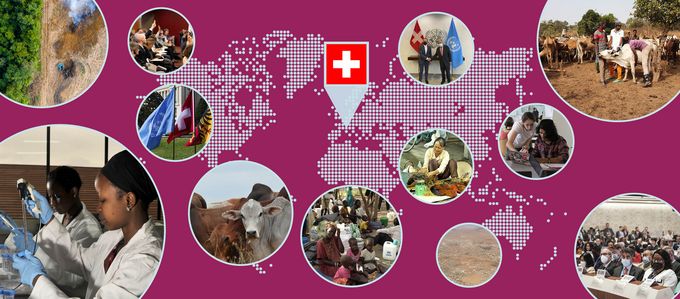Co-authored by over 30 international experts, a new policy brief has been published which recommends leveraging Switzerland’s scientific and diplomatic role in One Health. The policy brief was led by the Geneva Science-Policy Interface and the Institute of Global Health at the University of Geneva in partnership with Swiss TPH and other organisations.

Backed by leading research institutions in Switzerland and Europe, the Geneva Science-Policy Interface (GSPI) is an independent, neutral platform that strives to enhance scientific engagement with global governance actors within the Geneva ecosystem. © GSPI
Providing solutions to health issues at the human-animal-environment interface involving multiple sectors, disciplines and affected communities: this is the core principle of the One Health approach. As a global leader in this field of research and a hub for diplomacy, Switzerland should apply cross-cutting One Health principles and methods to improve prevention, preparedness and response to future epidemics and pandemics on an international level.
“Catalysing One Health with Swiss diplomacy” is a policy brief written by researchers from the University of Geneva (UNIGE) and the Geneva Science-Policy Interface (GSPI) in partnership with Swiss TPH and other organizations. Mandated by the Swiss Federal Department of Foreign Affairs (FDFA), the brief proposes three recommendations and 13 action points to leverage Switzerland’s diplomatic forces, international cooperation strategies and scientific excellence in taking a leading role in One Health governance.
Switzerland as a leader in One Health research
The COVID-19 crisis has unveiled many weaknesses of national health systems and of global health security. Researchers worldwide have been calling for health systems to take a more holistic turn through the adoption of One Health, integrating human, animal and environmental health into a single lens of analysis and action.
Switzerland, as a leader in One Health research and as a model of democratic governance, should leverage its diplomatic know-how to take an active, leading role in the prevention, preparedness and response to future epidemics and pandemics. This policy brief is addressed to the Swiss government as much as to the international diplomatic and research communities both in Switzerland and in countries at risk of infectious disease emergence.
I. Increased diplomatic efforts
Switzerland should prioritise and increase its commitment to ongoing diplomatic efforts related to epidemic and pandemic prevention, preparedness, and response using One Health.
One Health is in line with Switzerland’s position as a promoter of multilateralism. It requires a strong focus on coordination, facilitation of dialogue, and collaboration, which are recognised areas of Swiss expertise. Among this recommendation’s action points is establishing a permanent interdisciplinary and cross-sectoral Swiss One Health roster of experts or advisory council – involving civil society representation – to provide agile technical support to the Swiss government, its partner countries, and other stakeholders based in Switzerland, such as NGOs and international organisations.
II. Aligned international cooperation strategies
Switzerland should align its international cooperation strategies with epidemic and pandemic risk, prevention and preparedness capacity and One Health needs.
Epidemics can exacerbate poverty, as well as socio-cultural and political tensions and can result in humanitarian crises. Humanitarian crises can favour the emergence of infectious disease outbreaks. Considering the Swiss tradition and expertise in humanitarian action, with Geneva and Switzerland hosting major humanitarian players, Switzerland should further integrate One Health and epidemic prevention, preparedness, and response as part of its cooperation strategies. One of the action points of this recommendation is to establish a dialogue between emerging infectious disease hotspot countries, the Swiss Agency for Development and Cooperation (SDC), and the Swiss One Health scientific community, to help identify the most relevant problems and needs to foster solution-oriented research and actions.
III. Policy-relevant research
Switzerland should support policy-relevant One Health research nationally and in countries at risk of infectious disease emergence.
Having analysed projects funded by the Swiss National Science Foundation in 2020 and 2021, the authors of the brief found a strong bias – including a severe geographic bias – in both Swiss and international research. Indeed, most of the projects responded to a rapid call for COVID-19 research, focused on human health, and were in the fields of biological and medical sciences, with only a minority of them focused on low- and middle-income countries. Among the actions listed under this recommendation is to map One Health research actors in a set of priority countries and regions that constitute emerging infectious disease hotspot countries and support national and international locally-produced quality research.
The authors conclude that One Health and some of the recommendations and actions of this policy brief also apply to other endemic and emerging public and global health issues. These issues include other infectious diseases, such as neglected zoonotic tropical diseases, or diseases caused by drug-resistant pathogens, but also non-infectious issues like human-wildlife conflicts, nutrition and health, and food security – among many others.
About the policy brief
The policy brief was developed by the Institute of Global Health (ISG) at the University of Geneva (UNIGE) and the Geneva Science-Policy Interface (GSPI), in partnership with the Swiss Tropical and Public Health Institute and the Geneva Health Forum, involving experts from the World Health Organisation, the Food and Agriculture Organization, the World Organisation for Animal Health and the University Hospitals of Geneva, among other relevant actors.
Original press release from UNIGE published on 28 September 2022.
